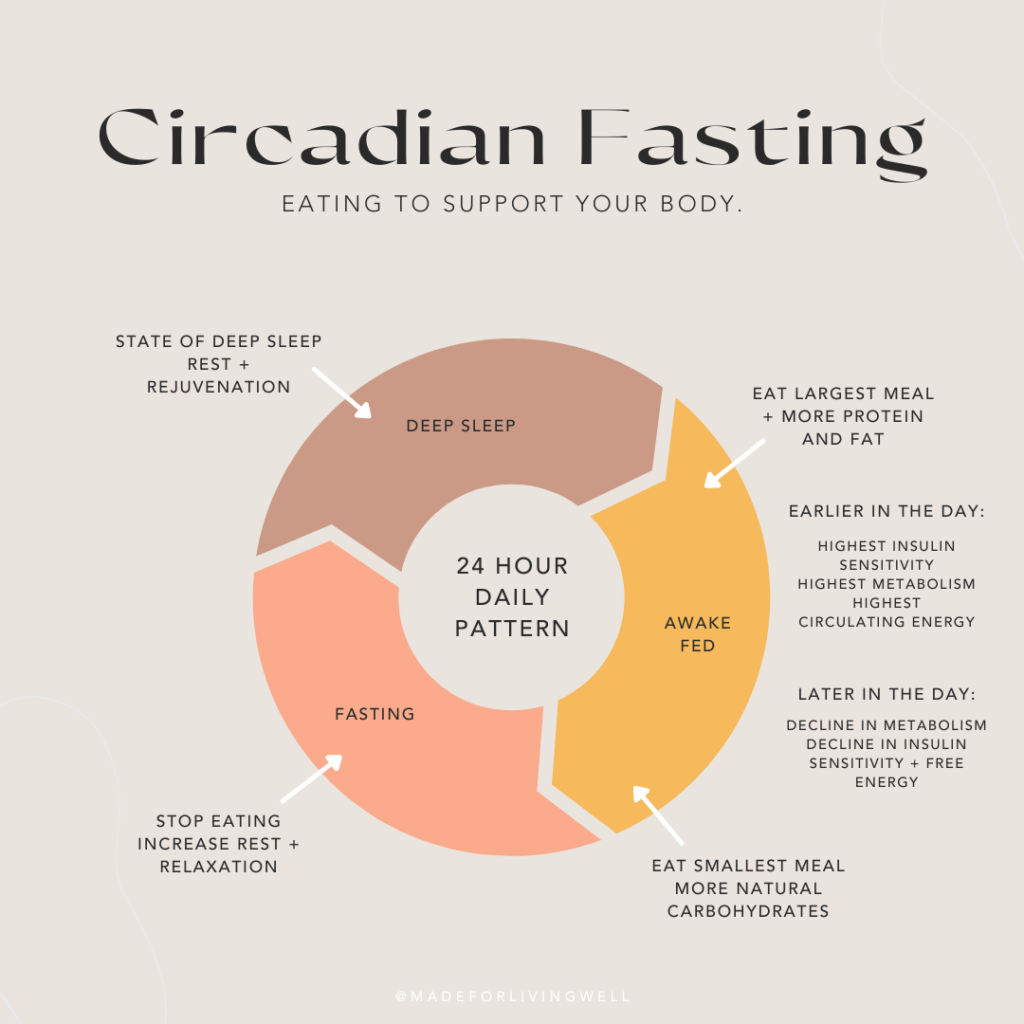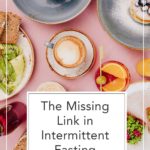
Is intermittent fasting healthy? Or is it another sexy health term that puts health inside a new box? Inside this podcast, I interview Dr. Michael Breus, America’s Sleep Doctor, to learn more about circadian living – using sleep to energize you to live.
The health space has become known for taking healthy things and pushing them to the extreme, making them unhealthy. In some cases, that’s what happened with intermittent fasting. You’re quick to hear it can help you lose weight, so we go all in. Regardless of its real benefit, you speed up results by taking the twelve-hour fast and pushing it to eight hours.
It might feel like you’re getting results, but most of the time, they’re just quick but fleeting results.
That’s because health is not about pushing your body to the extremes. Pushing the body in this way leads to burnout and exhaustion. The answer to health has always been and will always be about energy flow. Energy is the personalized tool that allows you to feel how your body responds, whether for health or against it—making energy one of the easiest ways to track your health.
Everything we do is working towards energizing the body or draining it. Not to say we can’t do both, but the key is to find a balance. It’s always about creating and sustaining a healthy flow of energy. That’s the importance of sleep, the food we eat, and even when we eat it.
Everything we encounter in life interacts with our energy. It’s the key thread running through the whole of who you are and the importance of energizing your body. Most of us need nothing more than a simple energy fix.
I talk with Dr. Michael Breus, America’s Sleep Doctor, about energy inside this podcast. You will learn how to use energy to change how you feel -using body type and sleep chronotype to create a personalized plan that works for you.
Is Intermittent Fasting Healthy? Here’s what it is.
Intermittent fasting (IF) was the most googled diet in 2019 and has since become the sexiest new way to lose weight without changing what you eat. That’s been a pretty profound change against the previous diet recommendations.
Not to mention, IF with some amazing health benefits. Study after study shows a daily period of fasting of at least 12-hours can reduce many chronic diseases created by western life. That’s all regardless of changing what they eat.
Ironically, focusing on the when of eating changes what you eat. Creating changes without the added work, all because you have distinguished periods of eating and periods of fasting.
Fasting is the period in the absence of food that your body enters a state of rest. But this state of rest does not mean sleep. Your body is working very hard to recharge and rejuvenate your body in a state of rest. But this state depends on a specific flow of hormones produced through a healthy circadian rhythm, complete in the absence of food.
The fed state is most commonly your wake period. It is when the body is hormonally primed and ready to digest, metabolize and use food for energy. The place where your circadian rhythm has shifted from rejuvenating energy to using energy.
Both states are different but energizing in their own way, showcasing why intermittent fasting is so critical. The problem isn’t with intermittent fasting but what you do with it—choosing to use it as a convenience to your lives rather than as support to your body. Support always comes from supporting your flow of energy. The root is always energy.

Why You Should Try Circadian Fasting (and living).
The question is, is intermittent fasting healthy? The answer is yes and no.
The problem with intermittent fasting is that we’ve failed to understand how the body responds. Like all things, even good things, it can become unhealthy if done in the wrong way or wrong time.
Unfortunately, that’s what has commonly happened with IF. The health space has been quick to remind you of fast weight loss, which leads you to use it as a convenience to your life rather than supporting it – working against the natural flow of hormones and your circadian clock.
Change only happens when you work with your body, not push it to conform to your way of life.
When it comes to eating, there is a time when your body hormonally and enzymatically is ready for food. That period of often earlier in the day when your body needs the extra support to help you get out and live. Not the period of your life when your body is working on slowing down and shutting down for the night.
In the ideal body, cortisol spikes in the morning, creating the drive to wake up and start your day. This spike in energy is why you feel awake in the morning while also working to send hunger signals throughout your body that it’s time to eat.
In the process of a rise in cortisol, your body also starts to produce adequate stomach acid, hormones and wakes up the cells to want energy. Meaning you’ll digest food better and have a higher metabolism while simultaneously not storing energy as fat if you eat earlier in the day.
As the day progresses and after your mid-afternoon cortisol climax, your body begins to slow down, slowing its need for energy and shifting your metabolic state to a lower working level. This changes the ability of your body to digest food, use it, and in many cases, your need for food drops drastically after mid-afternoon.
That doesn’t mean you shouldn’t eat at night. You just don’t need a lot of food post-mid-afternoon. Shifting your fasting window earlier in the day can make all of the difference in changing your body.
How to Circadian fast
Circadian fasting means you eat based on the sun cycles. As the sun rises, so does your metabolism, increasing your ability to digest food and use it – decreasing GI problems and weight gain.
The circadian clock of your cells and rhythms of your hormones also proves breakfast and lunch should be the largest meals of the day while significantly decreasing how much food you consume as the sunsets. Ideally, this means you move your fed state to earlier in the day. Breaking your fast 30 minutes to two hours after waking up and starting that fast three to four hours before bed.
What time this should be depends on many factors, but most critically is your sleep patterns. Not all of us get or need eight hours a night. Some need less. On the other hand, when our energy flow is circulating can depend on whether you are a night owl or a morning person. Knowing your sleep chronotype can help you understand your circadian clock to understand your energy patterns – creating a routine to eating that is both practical to your life and healthy for your body.
When you learn your sleep chronotype, you can partner that with your body type to determine the length of your fast, producing a realistic view of when you should eat that will have the most significant benefit.
How Long Should You Fast?
The length of your fast is dependent on many factors. Some of which need experimenting to help you understand what is most energizing for you. Again, energy is the gold standard for what is working and what isn’t inside your body.
In some cases, a healthy rotation is the best option, with the minimum length of fasting at least 12 hours. Some people need to stop at 12 hours and some people can push that fast to 16 hours.
Dr. Michael Breus explains how to make the right choice for your body type.
Body type most often refers to the natural structure of your body, commonly broken up into three groups, ectomorph, mesomorph, and endomorph.
Ectomorphs naturally have a higher metabolism and a leaner and longer frame. They tend to have a greater need for external energy sources like food, which also leaves us to recognize their fast should be no lo less and no longer than roughly 12-hours nightly.
Mesomorphs are more of a muscular build. They’re not overweight or underweight and can generally handle a decent load of stress. Mesomorphs can benefit from fasting 12-14 hours a day.
Endomorphs are larger in build while generally softer in nature. They tend to struggle with their weight and have a lower resting metabolism, decreasing their need for energy. Endomorphs can often benefit from a longer fast of 14-16 hours a day.
Again, in either case, shifting that fast to be earlier in the day.
Want to Try it Out?
Try it out for yourself and pay attention to how you feel. It generally only takes two to three days for your body to adjust to a fasting lifestyle considering this is the natural and intended design of the body – to experience periods of fed energy and rest energy.
Get started by moving your fasting window to as close as 12 hours as possible. Make sure you don’t skip breakfast, consuming most of your calories earlier in the day. If you need to cut a meal, make it your last meal of the day. Pay attention to how you feel.
After you succeed at 12-hours, lean into your sleep chronotype and body type to make a plan that will support your body.
Remember, circadian fasting is not about perfection. It’s about consistency. There will be times when starting your fast at seven is impractical to your lifestyle. Don’t worry about the times when you go out late and snack past nine as long as they rarely happen, not all the time.
Stick to the plan as often as possible. It will help you sleep better, rejuvenate more deeply and feel better overall. Try it out, and let me know how you feel.
If you liked this, you’ll love these!
Make sure you check out Dr. Breus‘ latest book, Energize. It dives into a circadian lifestyle making sense of when to eat, workout, sleep, have sex, be creative, and do it all with abundant energy. You can get all of the resources by using these links:
- Get the book Energize here.
- Take the quiz to find your sleep chronotype here.
- Learn about The Power of When.
- Follow Dr. Michael Breus here.
Don’t forget to find check out all of the podcasts in this series, Eight Life-Transforming Health Tips You Need To Change Your Health.
